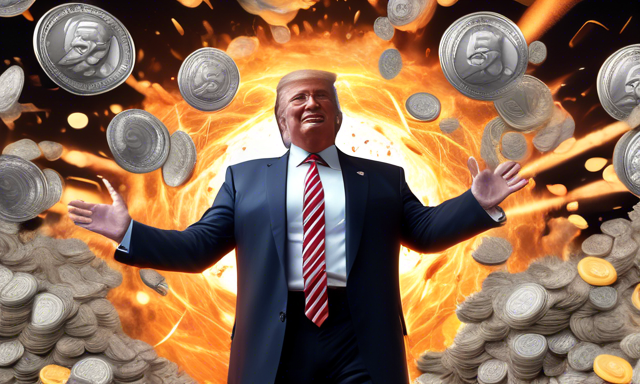🚀 A Historic Shift in U.S. Cryptocurrency Policy
This year marks a pivotal moment for the cryptocurrency domain as the political landscape in the United States evolves. Following Donald Trump’s electoral win, notable developments are emerging, particularly concerning Bitcoin. Senator Cynthia Lummis is preparing to introduce a groundbreaking piece of legislation aimed at establishing a Bitcoin Strategic Reserve. This initiative has the potential to reshape the government’s relationship with cryptocurrencies significantly.
🔍 Senator Lummis Unveils the Bitcoin Strategic Reserve Proposal
On July 31, Senator Lummis laid the groundwork for the Bitcoin Strategic Reserve through a significant piece of legislation. This bill, one of the most consequential after Trump’s victory, intends to create a robust framework for Bitcoin integration within the U.S. financial system.
The proposed law envisions a decentralized network of Bitcoin vaults managed by the U.S. Treasury, aimed at accumulating a total of one million Bitcoin, equaling around 5% of the total Bitcoin supply. This strategic reserve would be funded through existing Treasury assets, mimicking the long-established framework for gold reserves.
Senator Lummis has long been a proponent of Bitcoin and has highlighted the reserve’s crucial role in addressing economic challenges such as inflation and rising national debt. She argues that these factors continue to undermine American families, pressing for decisive actions to secure better economic conditions.
This initiative also underscores the importance of self-custody rights amidst increasing scrutiny from lawmakers, reflecting a broader debate about cryptocurrency ownership and personal financial autonomy.
💡 Trump’s Vision Aligns with Cryptocurrency Advancement
This year, Trump’s sentiments toward Bitcoin resonate strongly with Lummis’ legislative agenda. He previously expressed a vision of situating the United States as a leader in cryptocurrency, viewing it as integral to future economic strategies. By advocating for a pro-crypto environment, Trump aims to foster innovation and growth within this sector.
As inflationary pressures and fluctuations in the U.S. dollar increasingly come to the fore, integrating Bitcoin into national financial strategies could serve as a hedge against economic instability. Many in the crypto community are optimistic that a structured approach to Bitcoin could enable the U.S. to harness its potential as a reliable store of value in challenging economic circumstances.
📈 Reactions to Trump’s Victory and its Implications for Crypto
The introduction of Lummis’ bill is generating a mix of enthusiasm and skepticism. Advocates believe that Bitcoin can provide stability during times of high inflation and economic uncertainty. They point out that the bill reiterates the importance of self-custody guidance, a timely aspect given the recent legislative debates surrounding this issue.
Trump’s administration is viewed as potentially more favorable toward cryptocurrencies, with his election reinforcing the optimism prevailing within the community. Voter sentiment appears to favor a pro-crypto revolution as supporters celebrate Trump’s commitment to fostering a supportive framework for digital currencies.
Following Trump’s election to the presidency with 277 electoral votes, his platform included promises of establishing a U.S. Bitcoin reserve and enhancing opportunities for the mining sector. The crypto community reacted positively, witnessing Bitcoin spike to new highs on November 6, coinciding with the election results.
🌟 Policy Shifts on the Horizon: Looking Ahead
In his victory address, Trump articulated a commitment to ushering in a “golden age” for America, underscoring his strong allegiance to cryptocurrency advancement. Following his win, a wave of pro-crypto candidates emerged within Congress, with 247 members elected to the House and an additional 15 to the Senate.
The implications of these developments look favorable for Bitcoin, with its value rising approximately 7% after the election, reaching around $73,580, and contributing to a total cryptocurrency market capitalization of around $2.6 trillion.
💭 Hot Take: The Future of U.S. Cryptocurrency Policy
This year’s progression toward potential policies for cryptocurrencies emphasizes a significant departure from traditional economic approaches. The movement towards integrating Bitcoin into the national strategy could have wide-ranging effects on the overall economy. There’s a growing recognition of the importance of digital currencies as tools for maintaining economic resilience, leading to a potential shift in financial dynamics. The future landscape of U.S. cryptocurrency policy holds much promise, opening doors for innovation and broader acceptance within both political and financial sectors.





 By
By
 By
By
 By
By

 By
By
 By
By